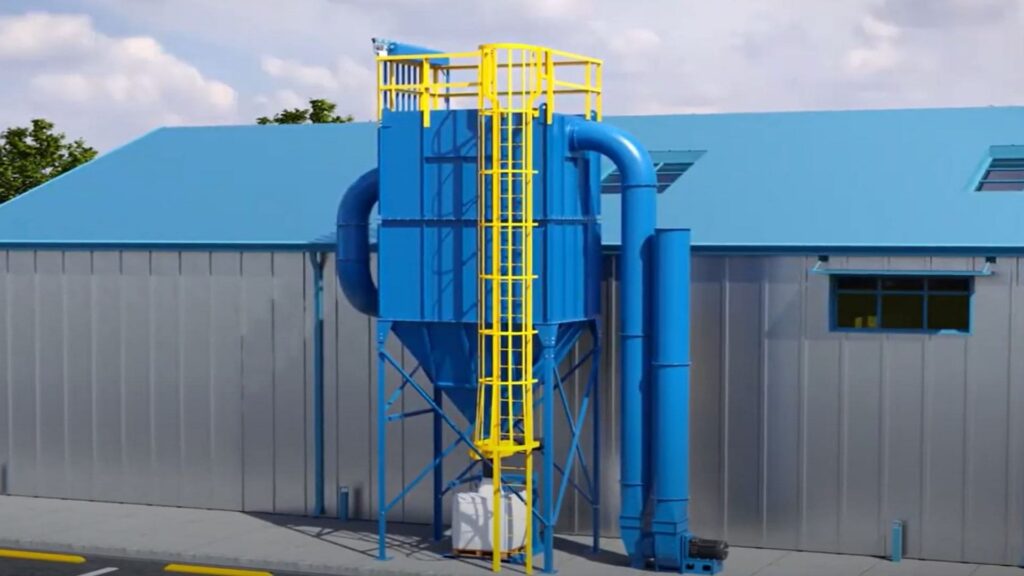Industrial Dust Collectors become imperative in any setting where a manufacturing process generates a significant amount of dust. The Dust Collector plays an important role not only in taking care of combustible dust but also protects employees from harmful dust and hazardous dust ailments while keeping the environment clean and increasing the life of other equipment and machinery in the plant. But before jumping on factors to consider while selecting an industrial dust collector for your process and facility, let’s start with the meaning of an industrial dust collector.
Industrial Dust Collector
A dust or smoke collector is nothing but an essential type of equipment used for controlling dust particles in industries like woodworking, agriculture, pharmaceuticals, metal manufacturing, mining, food processing, and chemical processing. A smoke collector meets environmental safety requirements by improving air quality in the workplace. A dust collection system is designed to filter and remove dangerous dust, and potentially hazardous fumes. There are various types of dust collectors for different industries but there are some factors that can help you in selecting an effective & efficient dust collector machine for your industry.
8 Factors to Consider While Selecting an Industrial Dust Collector
Air Flow Capacity
The most important factor to consider when selecting an industrial dust collector is the air flow capacity. This is measured in cubic feet per minute (CFM) and it is crucial to choose a dust collector with an air flow capacity that can handle the volume of air that needs to be processed. If the dust collector’s air flow capacity is too low, it will not be able to effectively remove dust from the air. On the other hand, if the air flow capacity is too high, it can lead to unnecessary energy consumption and higher operating costs.
Type & Properties of Dust
There are many types of dust & properties of dust that should be considered while selecting an industrial dust collector. The size of the dust particles, the moisture, texture, the temperature and volume of the dust will directly factor into what type of industrial dust collector can collect the dust from the application most effectively. Fine, dry and powdery dust is usually best collected with a cartridge-type dust collector. The speciality of cartridge-style filters is it can easily capture this type of smoke particles. And for sticky and oily types of dust, Baghouse dust collectors are generally used. Temperatures greater than 260 degrees will warrant special filters and accessories inside the collector.
Space Availability
The size and space of the dust collector are also important factors to consider. Ensure that the dust collector can fit in the available space and that it can handle the volume of air that needs to be processed. It is important to take accurate measurements of the space where the dust collector will be installed, either inside or outside to ensure that it will fit properly. The outside temperatures should also be considered if the collector will be located outside of the plant. The best way is to go with a custom space dust collector, where dust collector manufacturers help you in selecting a perfect industrial dust collector machine.
Type of Dust Collector
The type of dust collector you are selecting will affect the machine’s efficiency, maintenance requirements, and cost.There are a variety of dust collectors available in the market like fabric filter baghouse, cartridge collectors, wet scrubbers, bin vent type & more. This depends upon the process and air volume then the type of dust collector will be selected whether it will be wet or dry.
Filtration Efficiency of Dust Collector
Filtration efficiency is another critical factor to consider when choosing a dust collector machine. The efficiency of a dust collector’s filter is measured by the minimum particle size it can capture and the percentage of particles it can remove from the air. A higher efficiency rating means a dust collector can capture smaller particles and remove a higher percentage of dust from the air. This is especially important for applications that generate fine dust particles, such as in the food or pharmaceutical industries. Filtration media to be selected according to the type and qualities of the dust. The filtration media includes fan, inlet, outlet, and hopper or receptacle all work simultaneously resulting in a better filtration system.
Maintenance of Dust Collector
Regular maintenance is required for dust collectors to ensure they are functioning properly. Consider factors such as filter replacement, cleaning, and inspection when choosing a dust collector. Some dust collector machines require more maintenance than others and some dust collectors need less but timely maintenance so it’s important to choose one that is easy to maintain and has a long lifespan.
NFPA Approved
The last but most important factor to be considered is whether the equipment is NFPA compliant for combustible dust. One also needs to check whether a dust hazard analysis is done, to avoid any fires, explosions and accidents in the factory.
Energy Efficiency
Energy efficiency is an important factor to consider when choosing a dust collector. Look for dust collectors that have high efficiency motors, variable speed drives, and other energy-saving features to help reduce operating costs. This is especially important for industrial dust collectors that will be in operation for long periods of time.
FAQs on How to Select a Dust Collector
1. Which is the First Step in Selecting an Appropriate Dust Collection System?
The first & most important step in choosing a dust collector system is to determine the location & size of the equipment you need. It can be for indoor or outdoor purposes and also it depends upon the type of industry you have.
2. What are the different types of dust collectors?
There are several different types of dust collectors available, including baghouses, cartridge collectors, cyclones, and electrostatic precipitators. Each type has its own advantages and disadvantages, so it’s important to choose the one that best suits your specific needs.
3. How do I determine the air flow capacity of a dust collector?
The air flow capacity of a dust collector is measured in cubic feet per minute (CFM). It is important to choose a dust collector that can handle the volume of air that needs to be processed.
4. What is filtration efficiency in dust collectors?
Filtration efficiency refers to the ability of a dust collector’s filter to capture and remove dust particles from the air. It is measured by the minimum particle size it can capture and the percentage of particles it can remove from the air.
5. How do I know if a dust collector is energy efficient?
Look for dust collectors that have high efficiency motors, variable speed drives, and other energy-saving features to help reduce operating costs. This is especially important for industrial dust collectors that will be in operation for long periods of time.
Conclusion
In conclusion, selecting an industrial dust collector requires careful consideration of several factors, including air flow capacity, filtration efficiency, collection method, size and space, material of construction, maintenance, cost, and energy efficiency. By taking the time to consider these factors, you can be sure to choose a dust collector that will effectively meet the needs of your industrial process.



